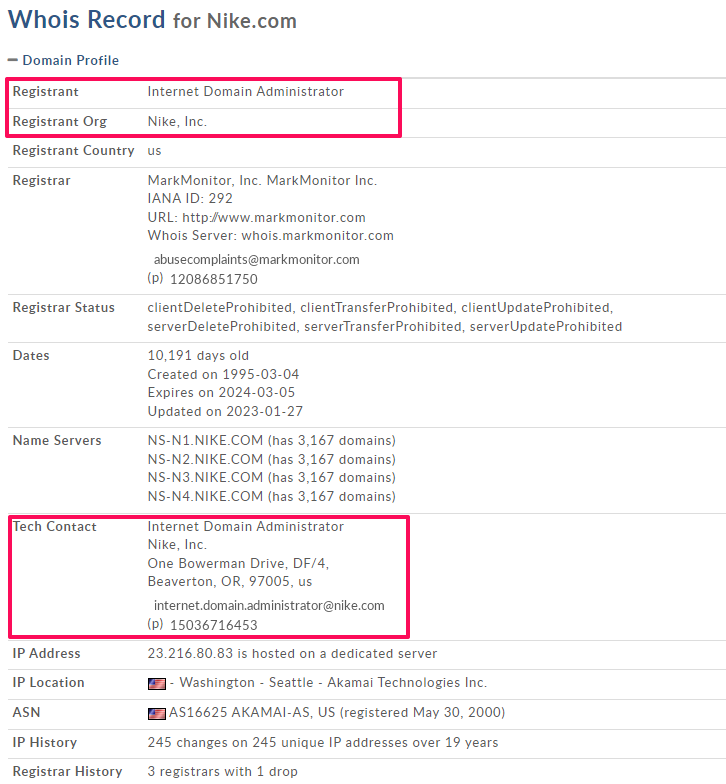When you buy a domain name, you might encounter an add-on service called ” Domain Privacy Protection“.
You might be wondering, what the heck is this?
Most domain registrars offer it for free. But for many, it is still a paid add-on. So do you need to invest in Domain Privacy Protection? Let’s find the answer to this in this article.
Table of Contents
What Is Domain Privacy Protection / Whois Privacy / Whoisguard?
When you buy a domain from any domain registrar (Namecheap, GoDaddy, etc.), you should provide a few personal and business information. Those are recorded in the ICANN database
By default, those pieces of information are available in the public domain, and anyone can see them by doing a Whois search.
Hackers can use that information to send you unwanted spam emails, call you over the phone, or, in fact, they can come to your address. These things are not desirable. Right?
That is why all domain registrars offer an add-on called domain privacy protection that protects your personal information from going public.
Instead, the Whois search shows some dummy data that is useless to bad guys.
Mostly, the Domain privacy protection add-on is offered for free, but many domain registrars may charge for this service.
Here is an example of what it looks like without and with domain privacy protection.


What is a Whois Lookup / Whois Directory?
Whois is a public domain name directory. It holds the database of all domain names, contact information, business information, etc.
Anyone can search a Whois directory to find information about a domain, its owners, and all related information.
Although the Whois search is used to learn about various domains, hackers can use the information to send you unwanted emails, spamming, etc.
How Does Domain Privacy Protection Work?
The domain privacy protection add-on hides your personal information from the common public and instead shows some dummy information.
Although ICANN has all your correct information, it is not publicly available. Since your personal information is not available in the public domain, you are safe from undesired activities against your domain.
How Much Does Whois Privacy Protection Cost?
Most domain registrars like Namecheap and IONOS offer domain privacy protection add-ons for free, but many registrars charge a fee for that. The fee varies from $1-$20.
Generally, the domain privacy protection add-on is free only for the first year. But whatever it is, you need to have domain privacy protection to safeguard your domain.
5 Reasons To Choose Domain Privacy Protection
Here are a few reasons why you should choose domain privacy protection for your domain.
1. Your personal information is not public anymore
Whether or not anyone does something bad with your personal information, posting it in the public domain is not desirable.
You may wonder how hackers can exploit you by knowing your domain’s personal information.
Hackers can easily hack your email addresses and phones, and through this, they can easily control your domain.
They can even access your website, delete posts, dump viruses in your website directory, etc. If your domain information is not public, you block that door for hackers.
2. Your data can not be sold
Data is the costliest asset in today’s world. If your data is in the public domain, anyone can sell it and earn from it. You might have heard about ” Facebook and WhatsApp” selling our data.
So you would not like to get sold off in the market. Right? That is why you should add a layer of protection to your domain so that your data is unavailable in the market.
3. Stops spam calls, spam emails
Yes, this is the most annoying thing that can happen to anyone if their data is available to the public. You may get tons of spam emails and calls, which can even come to your physical address.
They can even send you phishing emails to hack your site, financial information, or anything that is not desirable. Domain privacy protection saves you from being spammed.
4. Fewer chances of your website getting hacked
When your data is not accessible by hackers, there is less chance that your website will be hacked.
Although there could be numerous other reasons why your website can be hacked, you are at least reducing the chances for hackers.
5. Your competitor won’t get your information
Your competitor may gain some advantage if they get your personal information. You are blocking the door by domain privacy protection.
Many people feel that they can buy a domain with fake data. But that is wrong. Domain registrars often verify the data you submit when buying a domain.
So, domain privacy protection is the only way to safeguard your data from competitors.
Conclusion: Domain Privacy Protection
So here is the deal. If your domain registrars offer domain privacy protection for free, go for it. If not, buy this add-on. Trust me, this will save you from many hassles and problems later.
As I said before that, domain privacy protection does not cost much. So it won’t be a big deal for you considering how important the business is for you.
FAQ | Domain Privacy Protection
Can I buy domain privacy protection for all domain extensions?
No, you can’t. A few country-specific domain extensions, such as .us and .uk, are restricted from domain privacy protection.
What is domain privacy protection / Domain Privacy?
Domain privacy protection is a security layer many domain registrars offer to safeguard your personal information from going public. You might have submitted this information while purchasing the domain name.
How much does Whois Privacy Protection cost?
Often, it is offered for free when you buy a domain. Otherwise, it costs between $1 to $20.
What is Whois Search?
Whois is an open public directory where anyone can search for a domain name and get information about that domain.
The Whois search only shows the demo data if domain privacy protection is enabled. Otherwise, it discloses all your personal information.